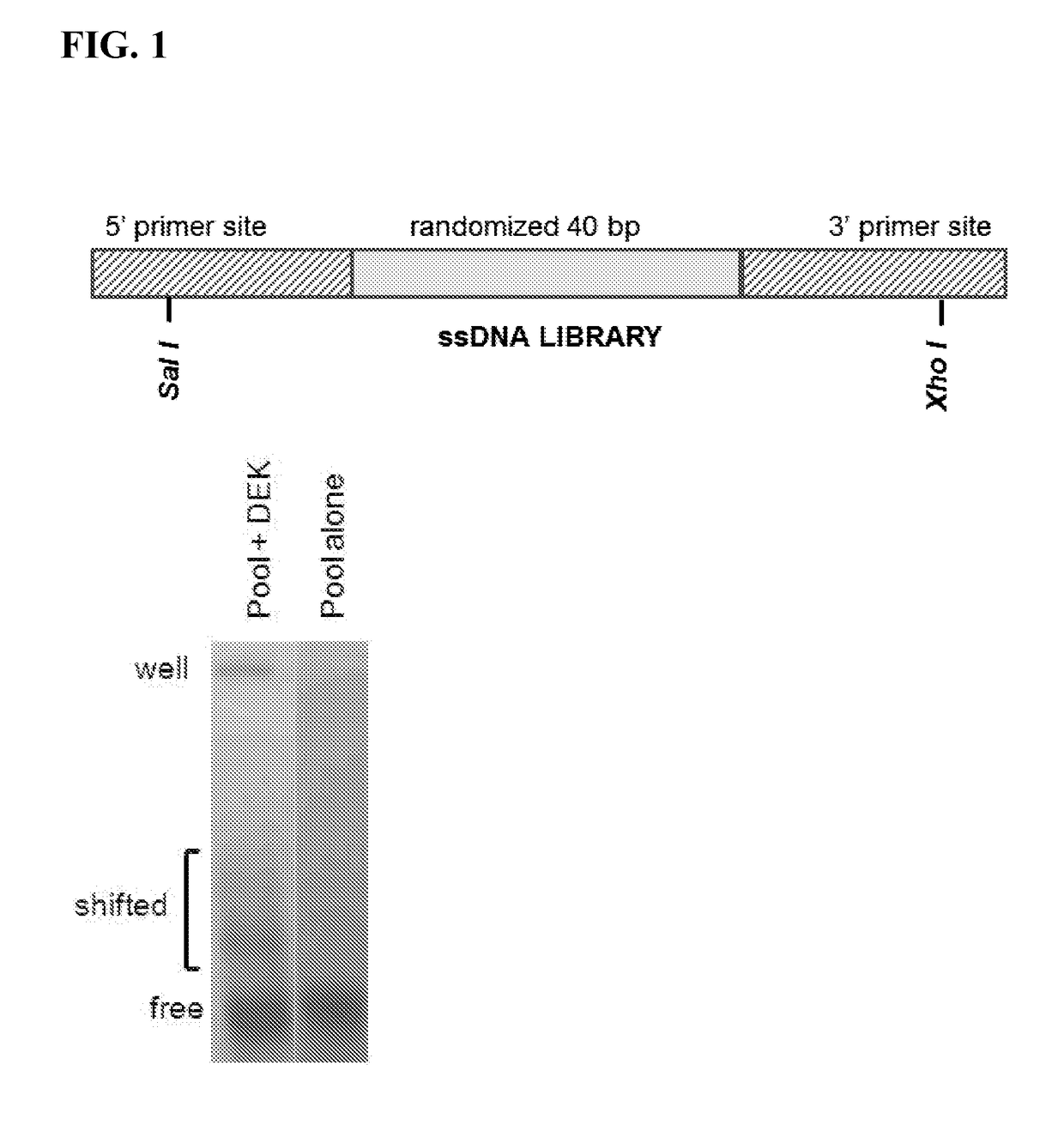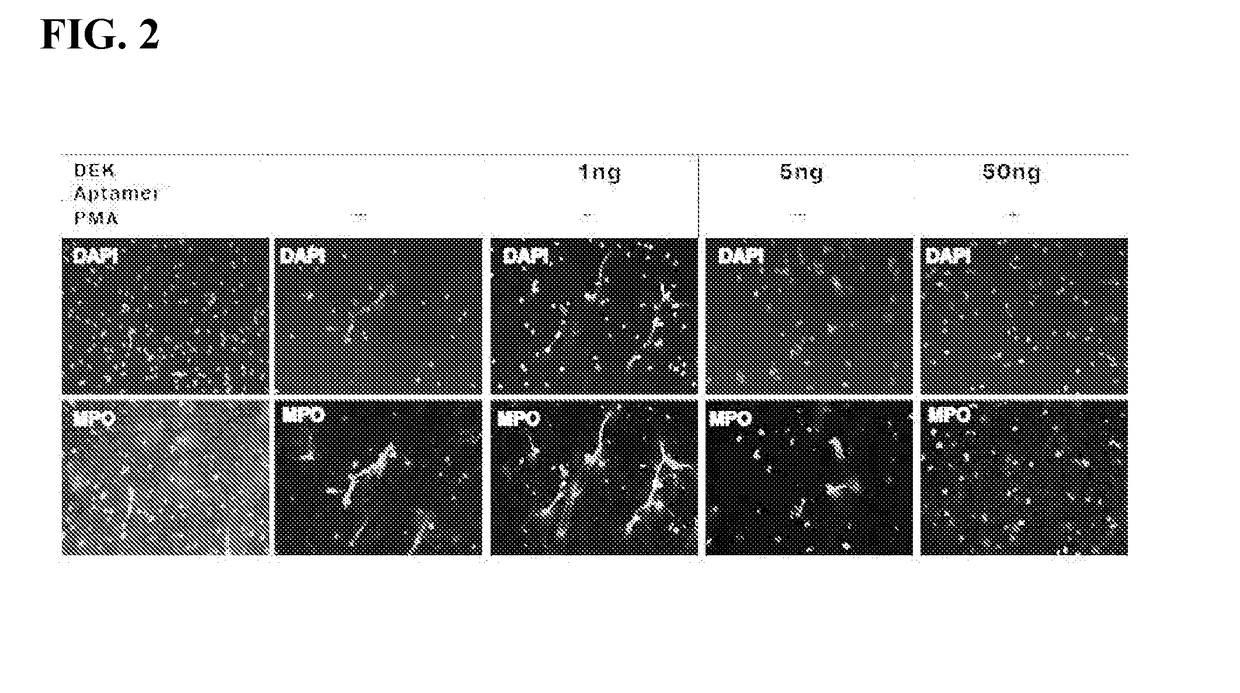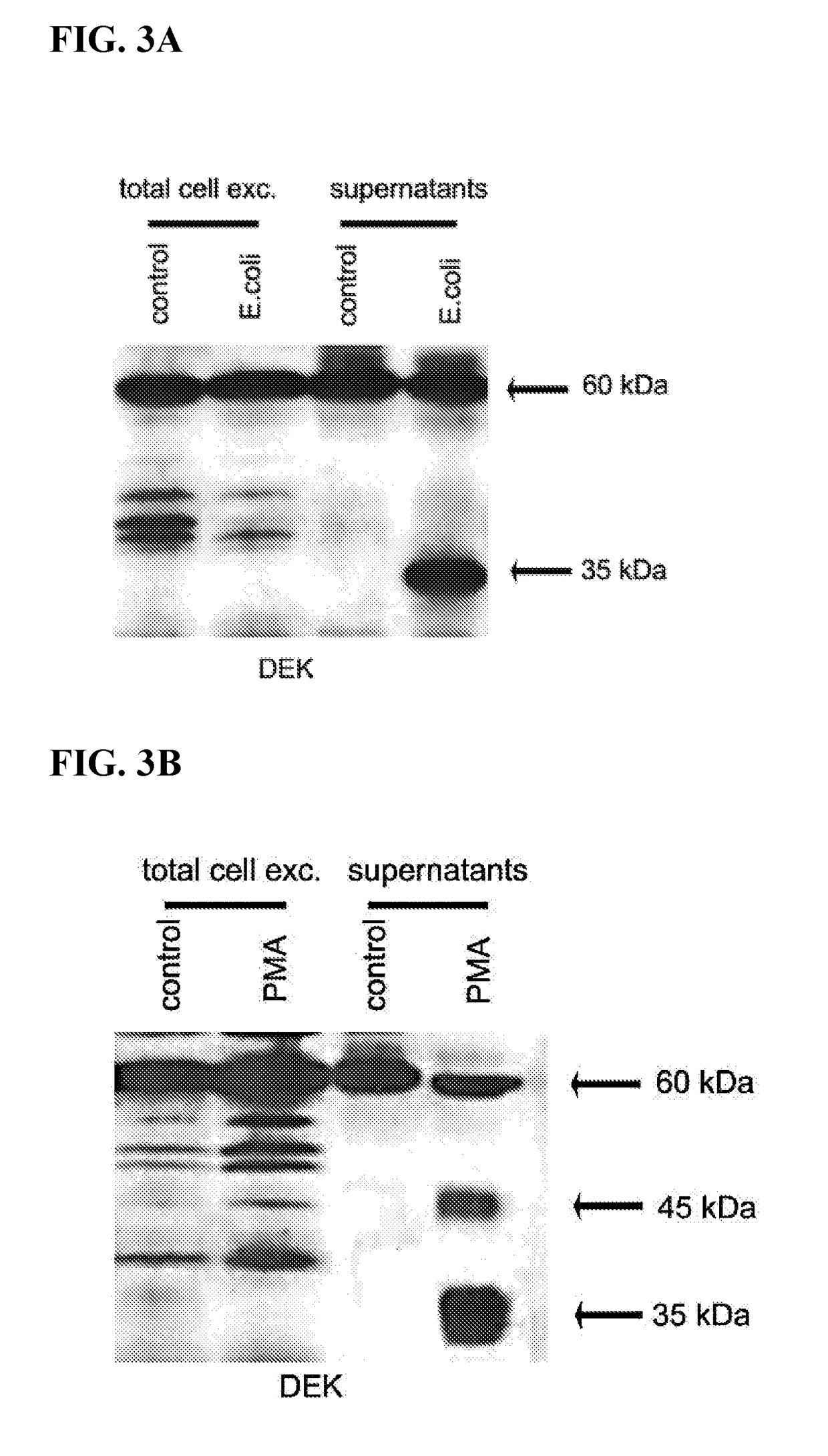Inhibitors of dek protein and related methods
a technology of dek protein and inhibitor, which is applied in the direction of instruments, drug compositions, immunological disorders, etc., can solve the problems that dek is not a favorable candidate for traditional small-molecule drug discovery, and achieve the effect of reducing signaling and preventing or reducing the binding of dek
- Summary
- Abstract
- Description
- Claims
- Application Information
AI Technical Summary
Benefits of technology
Problems solved by technology
Method used
Image
Examples
example 1
[0140]This example describes a selection protocol for DEK aptamers.
[0141]SELEX technology, a method that selects for either single-stranded DNAs or RNAs that bind tightly to the protein of interest and can potentially inactivate its function, was used to generate anti-DEK apamters. (Nimjee, S. M., Rusconi, C. P. & Sullenger, B. A. Aptamers: an emerging class of therapeutics. Annu Rev Med 56, 555-583, doi:10.1146 / annurev.med.56.062904.144915 (2005), Que-Gewirth, N. S. & Sullenger, B. A. Gene therapy progress and prospects: RNA aptamers. Gene therapy 14, 283-291, doi:10.1038 / sj.gt.3302900 (2007).) SELEX is performed using multiple rounds of selection
[0142]and
involves screening large numbers of random DNA or RNA sequences to identify a sequence
[0143]of
interest. A 40 nucleotide, single-stranded DNA 5′-GGG GTT AAA TAT TCC CAC ATT
[0144]GCC
TGC GCC AGT ACA AAT AG-3′ (SEQ ID NO: 6), with high affinity for recombinant DEK protein produced in a baculovirus system which binds tightly to DEK. A ...
example 2
[0154]This example describes cloning via pGEM-T kit to obtain “monoclonal” aptamers with individual sequences and properties.
[0155]Cloning was performed following the protocol in the Promega pGEM-T kit (Model A3600, Madison, Wis.) using a 3:1 molar ratio of final aptamer pool made double-stranded by PCR to pGEM plasmid, and the electroporation transformation (BioRad Gene Pulser, according to manufacturer's instructions (Hercules, Calif.). After plating on LB / Amp media and incubating overnight, white colonies were randomly selected and placed into a symmetric (1:1 (125 uM: 125 nM) 5′ primer to 3′ primer PCR reaction. (Symmetric PCR conditions: 94° C. 5′ [94° C. 30 s, 55° C. 30 s, 72° C. 30 s]×20 rounds, 72° C. C 10′, 4° C. hold) using the 5′ and 3′ primers as above.
example 3
[0156]This example describes PCR amplification with radiolabeling.
[0157]After the symmetric PCR was complete to create double-stranded DNA corresponding to the DEK-binding aptamers, the DNA was gel-isolated through 6% denaturing polyacrylamide gels, soaked out into water, and ethanol precipitated with 2.5 volumes of ethanol. This DNA was used with an approximately 5× molar excess of only the 5′ primer (sequence same as above) that had been radiolabeled to approximately 10,000,000 counts per microgram labeling with T4 polynucleotide kinase and gamma-32P-ATP as above. The asymmetric PCR (repeated unidirectional primer extension) components were as follows:
ReagentsAmount per reaction (uL)DNA from Symmetric PCR10Taq polymerase1 standard unitTaq Buffer 10x (no gelatin)10dNTPs (8 mM)2.55′ LIB SEL No T7 (non-radiolabeled)0.2532p 5′1,000,000 CPMTaq DNA pol (1:20 dilution of stock)5H2OUp to 100 uL
[0158]The asymmetric PCR conditions were: 94° C. 5″, [94° C. 30″, 59° C. 0″, 72° C. 30″]×15 roun...
PUM
| Property | Measurement | Unit |
|---|---|---|
| dissociation constant | aaaaa | aaaaa |
| dissociation constant | aaaaa | aaaaa |
| dissociation constant | aaaaa | aaaaa |
Abstract
Description
Claims
Application Information
 Login to View More
Login to View More - R&D
- Intellectual Property
- Life Sciences
- Materials
- Tech Scout
- Unparalleled Data Quality
- Higher Quality Content
- 60% Fewer Hallucinations
Browse by: Latest US Patents, China's latest patents, Technical Efficacy Thesaurus, Application Domain, Technology Topic, Popular Technical Reports.
© 2025 PatSnap. All rights reserved.Legal|Privacy policy|Modern Slavery Act Transparency Statement|Sitemap|About US| Contact US: help@patsnap.com



